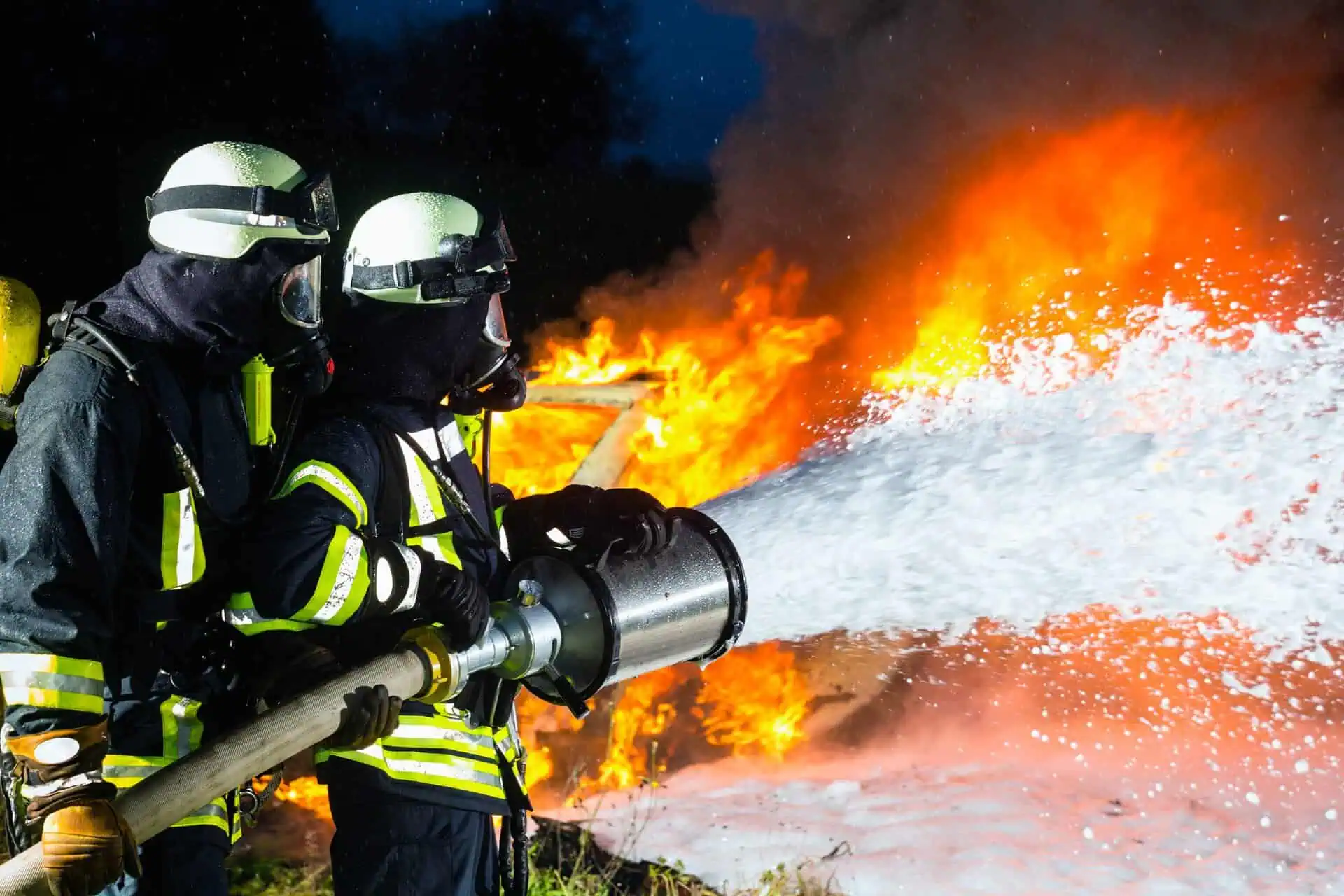AFFF Lawsuits Guide: Unraveling the Legal Process Step-by-Step
- Last Updated: July 14th, 2025

Attorney Jessica Paluch-Hoerman, founder of TruLaw, has over 28 years of experience as a personal injury and mass tort attorney, and previously worked as an international tax attorney at Deloitte. Jessie collaborates with attorneys nationwide — enabling her to share reliable, up-to-date legal information with our readers.
Legally Reviewed
This article has been written and reviewed for legal accuracy and clarity by the team of writers and legal experts at TruLaw and is as accurate as possible. This content should not be taken as legal advice from an attorney. If you would like to learn more about our owner and experienced injury lawyer, Jessie Paluch, you can do so here.
Fact-Checked
TruLaw does everything possible to make sure the information in this article is up to date and accurate. If you need specific legal advice about your case, contact us by using the chat on the bottom of this page. This article should not be taken as advice from an attorney.
Key takeaways:
- Class action lawsuits involve multiple plaintiffs who've suffered similar harm.
- Plaintiffs often encounter hurdles such as proving commonality among all claimants and ensuring adequate representation.
- The complexities involved in AFFF lawsuits are numerous, from the initial steps of filing a suit to post-trial proceedings.
AFFF Lawsuits Guide: Unraveling the Legal Process Step-by-Step
On this page, we’ll discuss AFFF lawsuits and the legal process, initiating an AFFF lawsuit, gathering evidence in an AFFF lawsuit case, who qualifies to file AFFF lawsuits, and much more.
Intro to AFFF Lawsuits
The landscape of AFFF lawsuits is a complex one, marked by intricate legal processes and a timeline that can be daunting.
These class action lawsuits demand a thorough understanding of each step involved in AFFF litigation to ensure successful navigation.
The importance of this comprehension cannot be understated as it significantly influences the outcome of these cases.
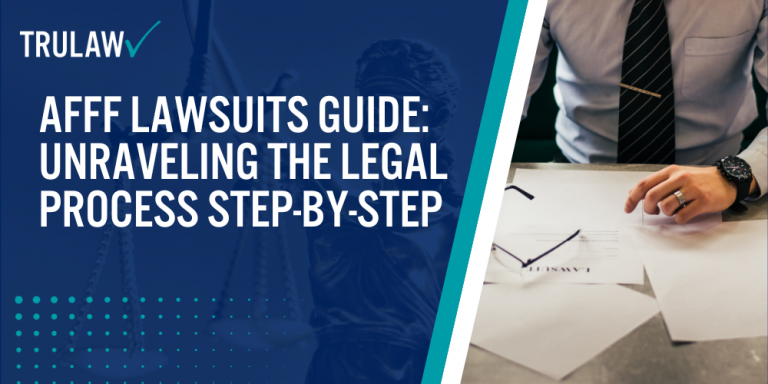
Familiarity with the typical timeline associated with such lawsuits provides strategic advantages, enabling better preparation and execution.
This aims to shed light on these critical aspects, offering readers an insightful overview into the world of AFFF lawsuits.
Table of Contents
Initiating an AFFF Class Action Lawsuits: First Steps and Considerations
Criteria to Consider Before Initiating a Lawsuit
Before you jump into the legal fray, there are some things you need to consider.
The first is whether you’ve been directly affected by Aqueous Film Forming Foam (AFFF).
Has this firefighting foam caused harm to your health or contaminated your property?
If so, you might have grounds for a lawsuit.
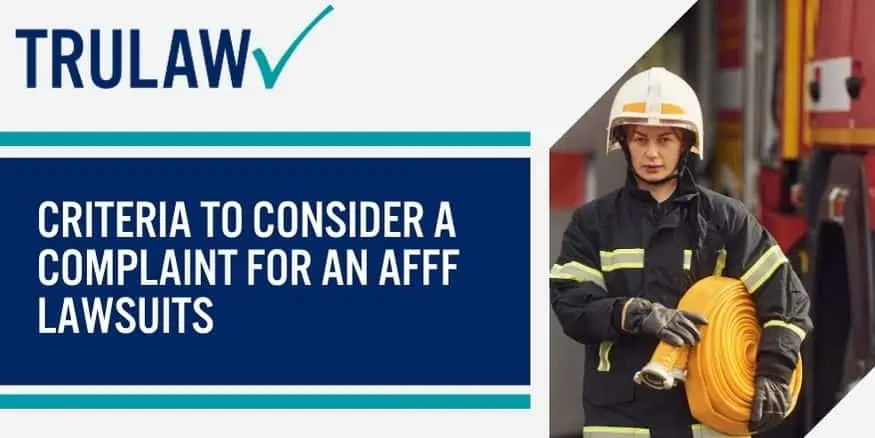
Secondly, think about the evidence.
Do you have medical records or other documents that support your claims?
Solid proof can make a big difference in the success of your case.
Lastly, consider if others are in the same boat as you.
Class action lawsuits involve multiple plaintiffs who’ve suffered similar harm.
If there’s a group of people affected by AFFF, it strengthens your case.
Filing a Complaint for an AFFF Lawsuits
So, how do you kickstart this legal process?
First off, consult with an attorney experienced in class action lawsuits and specifically those involving firefighting foams.
They’ll guide you through the process and help draft your complaint.
The complaint outlines your allegations against the defendants – usually manufacturers of firefighting foam like 3M or DuPont.
It details how their product has harmed you and why they should be held liable.
Remember to include all relevant information such as dates of exposure, symptoms experienced, and any related costs incurred.
The Role of Plaintiffs’ Allegations
Plaintiffs’ allegations play a pivotal role in shaping these lawsuits.
These statements form the basis of the litigation.
They detail what happened, how it happened and who is responsible for it.
Allegations must be compelling enough to convince the court that the case merits further investigation.
Strong evidence backing up these claims can swing things in favor of plaintiffs during pretrial motions or even at trial stages.
Impact on Course of Litigation
The initial considerations and allegations can significantly impact the course of litigation of AFFF lawsuits.
A well-prepared case with strong evidence can lead to early settlements.
Companies often prefer to settle rather than risk a negative verdict that could cost them millions.
On the flip side, weak cases may get dismissed or result in unfavorable judgments. So, it’s crucial to take these first steps seriously.
Gathering Evidence in AFFF Class Action Cases: What You Need to Know
Nailing down a AFFF class action lawsuit requires substantial evidence.
Here’s the nitty-gritty of gathering and presenting crucial evidence in AFFF lawsuits case.
Types of Crucial Evidence for AFFF Cases
Certain types of evidence carry more weight than others.
Scientific evidence often takes center stage, with new research and data playing pivotal roles.
For instance, studies linking AFFF exposure to specific health conditions can provide compelling causation evidence.
Medical records are another key piece of the puzzle.
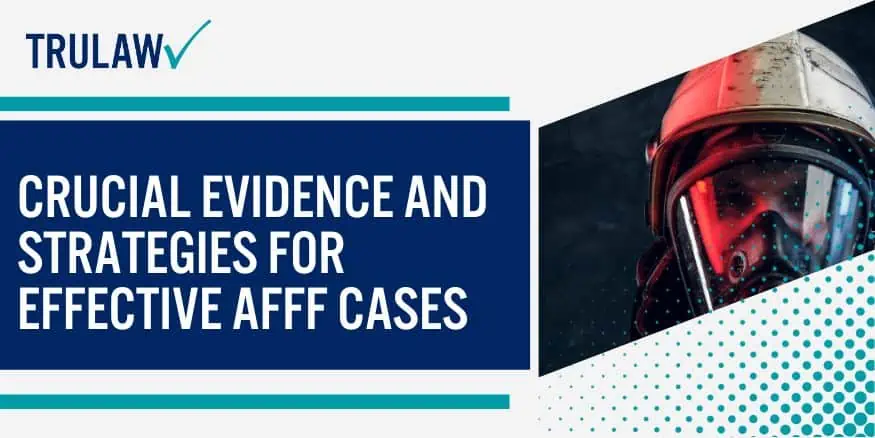
These documents can help establish a direct link between exposure to firefighting foam and subsequent health issues.
Strategies for Effective Evidence Gathering
Collecting pertinent evidence is no small feat; it requires strategic planning.
One effective method involves working closely with medical professionals who can provide expert testimony on the effects of toxic substances found in firefighting foams.
Tracking down witnesses who can attest to the circumstances surrounding your exposure can be invaluable.
This might include fellow firefighters, workplace supervisors, or even local residents.
Role of Expert Witnesses in Presenting Evidence
Expert witnesses play an instrumental role in these AFFF Lawsuits cases.
Their testimony helps bridge the gap between complex scientific concepts and layman’s understanding.
For instance, a toxicologist could explain how perfluoroalkyl and polyfluoroalkyl substances (PFAS), common components in AFFFs, interact with human biology.
An epidemiologist might present statistical data showing increased rates of specific illnesses among those exposed to these chemicals.
Legal Requirements for Disclosure and Preservation of Evidence
Legal requirements around disclosure and preservation of evidence are stringent—and for good reason!
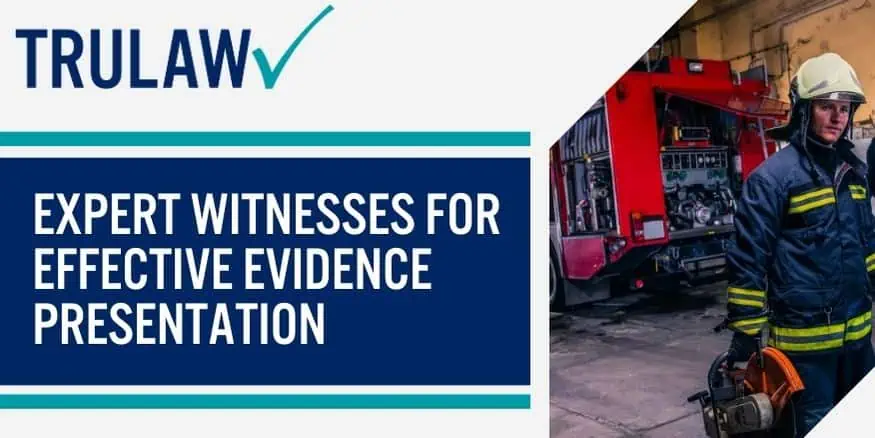
Parties involved in AFFF lawsuits must ensure all relevant information is not only preserved but also disclosed appropriately under legal guidelines.
This includes any internal documents from manufacturers that may shed light on their knowledge about potential risks associated with their products.
Failure to comply with these requirements could lead to severe legal repercussions.
The Role of Legal Counsel in AFFF Class Action Lawsuits
Legal counsel plays a crucial role in AFFF lawsuits.
Choosing the right lawyer can significantly influence the outcome of your case.
Duties and Responsibilities of Attorneys
In an AFFF lawsuit, attorneys have several responsibilities.
They’re not just there to argue the case; they’re also there to guide you through this legal maze.
Firefighting foam lawyers are responsible for gathering evidence, which includes medical records and firefighting history.
They need to prove that exposure to AFFF caused health issues like cancer.
Lawyers also negotiate settlements with manufacturers or take the case to trial if necessary.
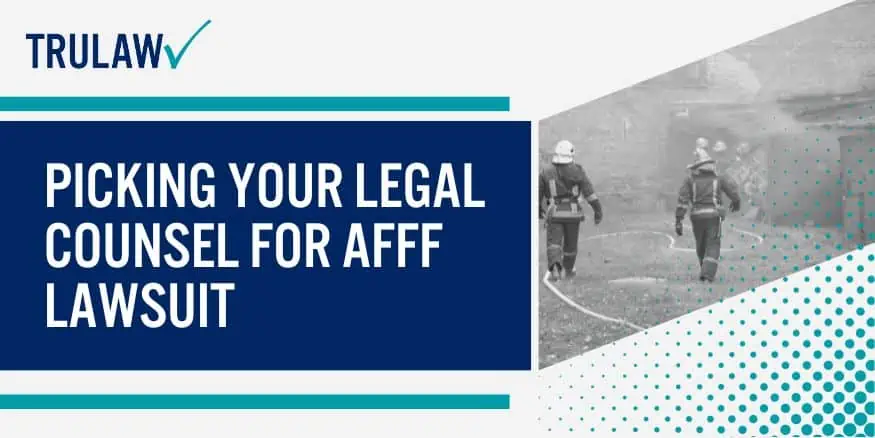
Picking Your Legal Counsel
Choosing your attorney is a significant decision.
It’s essential to pick someone experienced in handling these kinds of cases.
Here are the things you must consider to pick experience legal counsel:
- Look for a law firm specializing in AFFF lawsuits.
- Check their track record – how many similar cases have they handled?
- Don’t forget about communication skills; you want someone who’ll keep you informed every step of the way.
Communication Between Plaintiffs and Lawyers
Open communication between plaintiffs and their AFFF attorneys is vital.
You should feel comfortable discussing every aspect of your case with them.
Here are the things you need to do and communicate between Plantiffs and lawyers:
- Ask questions whenever you need clarity on any issue.
- Regular updates from your lawyer are crucial – they should keep you informed about any developments in your case.
Many law firms offer free consultations, giving potential clients a chance to discuss their situation without obligation.
It’s a good opportunity to get a feel for whether they’re the right fit for you.
Certifying a Class in AFFF Lawsuits: Understanding the Process
The Criteria for Class Action Suit Certification
Courts utilize specific criteria to certify a class action suit.
They examine factors such as the number of plaintiffs, commonality of claims, and the representative party’s ability to protect class interests.
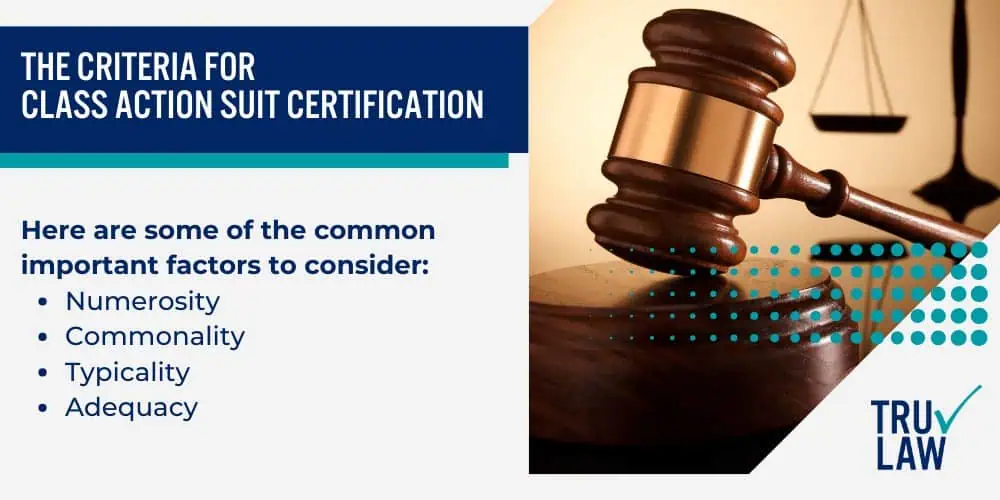
Here are some of the common important factors to consider:
- Numerosity: This implies that there are so many potential plaintiffs that it would be impractical for each to file individual lawsuits.
- Commonality: The issues affecting the class members must be common.
- Typicality: Claims or defenses of the representative parties should be typical of those of the class.
- Adequacy: Representative parties must fairly and adequately protect the interests of all members.
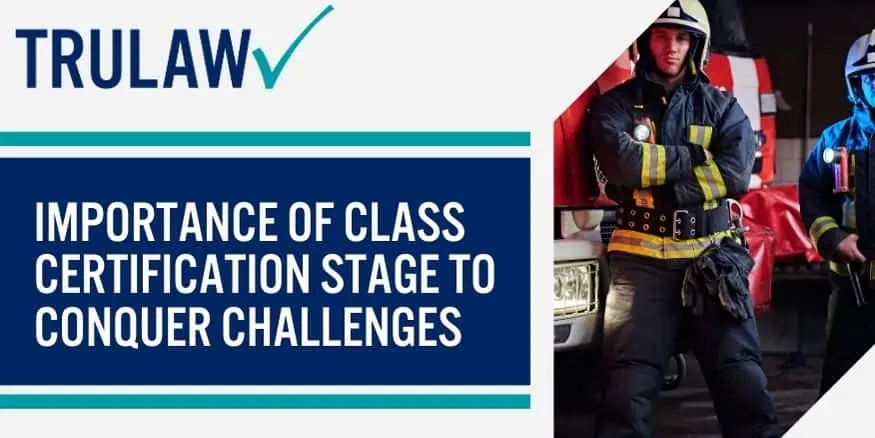
Implications and Importance of Class Certification Stage
The class certification stage is crucial in AFFF lawsuits.
It determines whether a case proceeds as an individual lawsuit or a collective legal battle.
If approved, it allows plaintiffs with similar claims to pool resources together, increasing their bargaining power against formidable defendants.
On the flip side, if denied, each plaintiff will have to face off against powerful corporations individually.
Challenges During Class Certification Process
Despite its benefits, achieving class certification isn’t always a walk in the park.
Plaintiffs often encounter hurdles such as proving commonality among all claimants and ensuring adequate representation.
Notifying Potential Class Members: Legal Requirements and Procedures
Notification Methods
Various methods can be used to notify potential members about pending lawsuits.
These include direct mail, email notifications, published notices in newspapers or websites, and even social media platforms.
For example, emergency responders might be informed about AFFF lawsuits via emails sent to their departments’ official addresses.
They must clearly outline potential health risks associated with AFFF exposure and provide comprehensive details about upcoming hearing schedules.
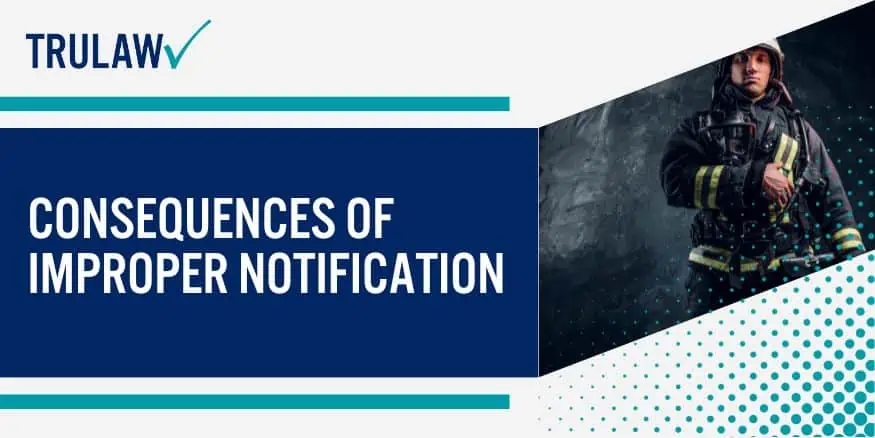
Consequences of Improper Notice
If proper notice is not given or received by potential members, there could be dire legal consequences.
For one thing, it may lead to dismissal of claims based on violation of due process rights.
In some cases invoking the discovery rule might become necessary.
This legal principle allows plaintiffs extra time to file a lawsuit when they couldn’t have reasonably known about their injuries or illnesses within the standard statute of limitations.
Take for instance firefighters who were exposed to AFFF without protective gear but only learned about the associated risks years later through toxicity studies.
They could potentially apply the discovery rule to file a lawsuit.
Rights, Options and Obligations Outlined in Notifications
Notifications sent out to potential class members must also outline their rights, options, and obligations.
These include the right to opt-out of the lawsuit or remain part of it, the option to hire personal counsel, and any obligations they might have such as providing evidence or testifying.
For example, if a fire department learns that its water supply has been contaminated by AFFF runoff from a nearby military base, it would receive notification outlining these options.
Similarly, military personnel who used defective earplugs causing hearing loss would be informed about their legal rights and potential remedies.
Settlements vs. Trials in AFFF Class Action Lawsuits: Weighing the Options
Cost, Time, and Potential Outcomes Comparison
Settlements and trials vary greatly in cost, time, and potential outcomes.
A settlement deal is often less expensive than a trial. Legal fees are reduced as there’s no need for a lengthy court process.
Trials can drag on for months or even years, while settlements provide quicker resolution.
But remember, speed doesn’t necessarily equate to justice served.
In terms of potential outcomes, trials offer the possibility of larger payouts but also carry the risk of losing entirely.
Conversely, settlements assure at least some compensation but might be less than what could be won at trial.
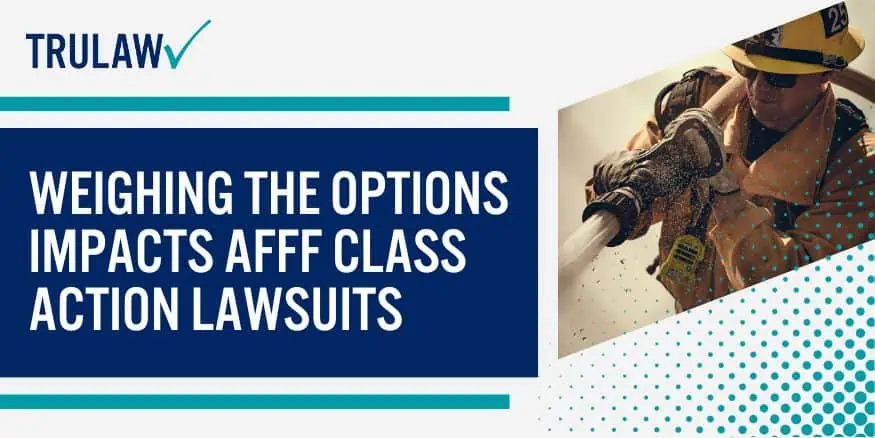
Factors Influencing Decision-Making
Multiple factors come into play when deciding between settling or going to trial.
These include the strength of evidence against the defendant company involved in contaminating water sources with AFFF (Aqueous Film Forming Foam), the financial resources available for litigation, and personal preferences of class members regarding privacy and stress levels.
Bellwether trials also play a significant role here.
As test trials that help predict future verdicts in similar cases, they can influence whether parties lean towards a global settlement deal or continue fighting it out in court.
Role of Legal Counsel
Legal counsel plays an indispensable role in this decision-making process.
They analyze each case’s unique circumstances, guiding class members through complex legal landscapes towards either a settlement agreement or summary judgment.
Lawyers bring their expertise to bear on evaluating evidence strength, estimating potential settlement amounts versus possible trial verdicts and understanding how bellwether case outcomes might impact their clients’ cases.
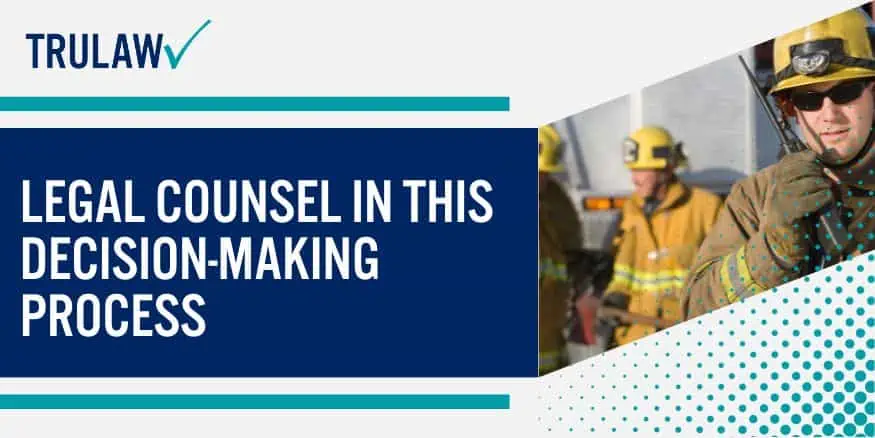
Impact on Class Members
This decision has profound implications for class members involved in these lawsuits.
Settlement payouts provide immediate relief but may not fully compensate for damages suffered due to contaminated water sources from AFFF usage.
Going to trial offers an opportunity for larger compensation but comes with the risk of a loss, which could leave class members with nothing.
It’s a high-stakes decision that demands careful consideration and expert legal advice.
Class Action Lawsuit Damages: Calculating Compensation for Affected Parties
AFFF lawsuits encompass a wide range of damages.
The compensation calculation and distribution process are influenced by various factors, including settlement agreements.
Types of Damages in AFFF Lawsuits
The types of damages claimed vary widely.
These damages often include personal injury claims related to health issues caused by exposure to firefighting foam.
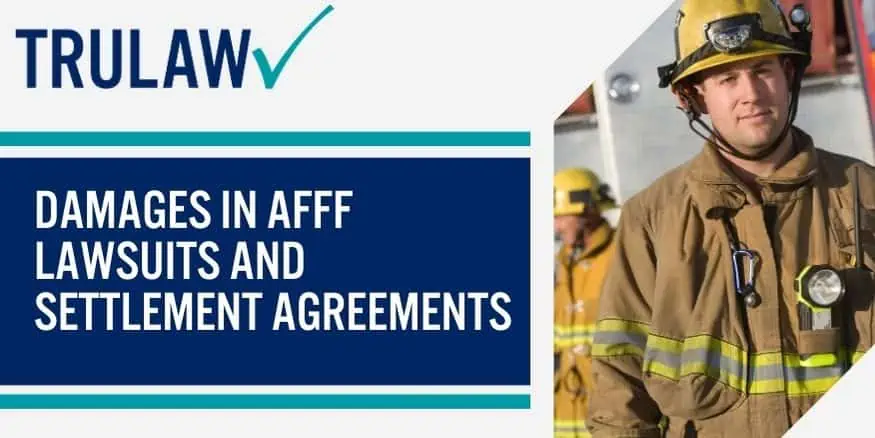
Here are the things possible included in your claims:
- Medical expenses: Plaintiffs can seek compensation for medical costs incurred due to diseases linked with AFFF exposure.
- Lost wages: If the plaintiff’s ability to work is affected, they may claim lost income.
- Pain and suffering: This is subjective but compensates for physical discomfort and emotional distress.
- Punitive damages: Courts may award these in cases where the defendant’s actions were particularly egregious.
Calculating Compensation Amounts
The financial compensation awarded in a class action lawsuit depends on many factors.
These include the severity of injuries sustained and the impact on quality of life.
Compensation amounts tend to be higher for severe, long-lasting injuries that significantly disrupt daily life and cause measurable financial losses like medical bills or lost earnings.
Distribution Process Among Class Members
In mass tort litigation like an AFFF class action lawsuit, distributing awarded damages can be complex.
The court usually appoints a ‘special master’ who determines how funds should be split among individual plaintiffs.
In proportional allocation, each plaintiff gets an amount equal to their specific damages.
Conversely, in flat-rate distribution, all plaintiffs receive the same amount, regardless of individual situations.
Influence of Settlement Agreements
Settlement agreements can greatly influence damage calculations in new lawsuits.
Often defendants agree to pay a lump sum, which is then distributed among the plaintiffs.
The plaintiff’s attorneys negotiate a fair settlement with the defendant, which must then receive court approval to ensure it benefits all class members.
Class Action Case Management: Ensuring Fairness and Efficiency
AFFF Class action lawsuits are complex, requiring effective case management strategies.
Courts employ various methods to ensure fairness and efficiency in these large-scale cases.
Effective Case Management in Class Actions
Effective case management is crucial in class action lawsuits, especially in class actions.
It ensures that the court can handle numerous similar cases efficiently without compromising on justice.
For instance, firefighting foam cases involving cancer claims from multiple clients necessitate a streamlined approach to avoid overwhelming the court system.
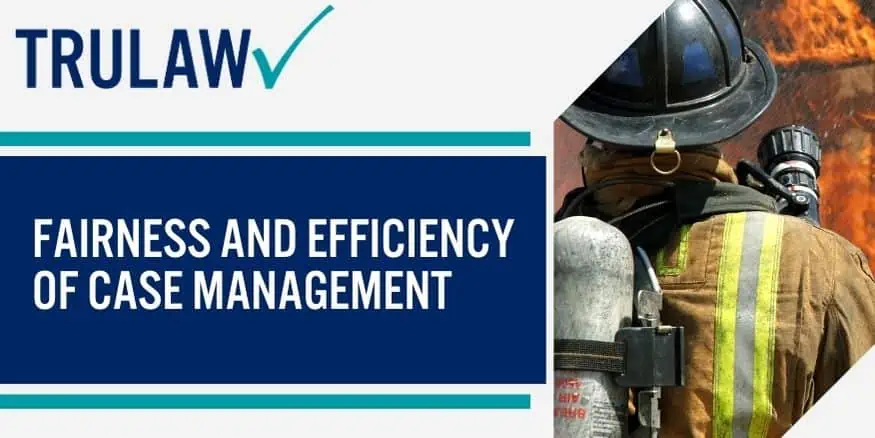
Here are things to include for efficient management:
- Streamlined processes reduce redundancy
- Efficient case handling saves time and resources
- Fairness is maintained for all parties involved
Court Strategies for Large Scale Cases
Courts have developed strategies to manage large scale cases effectively. One such strategy involves grouping similar cases together into a multi-district litigation (MDL) class action.
This allows one judge to oversee related lawsuits, ensuring consistent rulings across the board.
Role of Case Management Orders
Case management orders (CMOs) play a pivotal role in guiding lawsuit proceedings.
These directives provide structure and outline the expectations for each stage of litigation.
In essence, CMOs serve as roadmaps for both parties and the court throughout the process.
Ensuring Fairness Throughout Litigation
Fairness is paramount throughout any legal process.
In class actions, courts take measures like appointing lead plaintiffs who represent the interests of all class members or setting up a jury trial if necessary.
Appeals and Post-Trial Proceedings in AFFF Class Action Litigation
The complexities involved in AFFF class action lawsuits are numerous, from the initial steps of filing a suit to post-trial proceedings.
Legal counsel plays a pivotal role throughout this process, providing guidance and expertise to navigate the intricacies of certifying a class, notifying potential members, and weighing settlement versus trial options.
It’s also crucial to understand how damages are calculated and how case management is conducted to ensure fairness and efficiency.
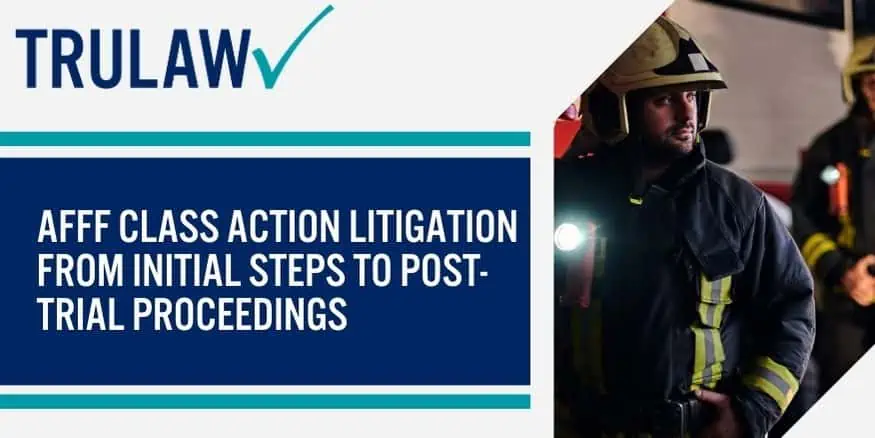
Engaging with an experienced legal team can help affected parties secure fair compensation for their losses.
If you or your community have been impacted by AFFF-related issues, don’t hesitate to reach out for professional legal advice.
Remember that knowledge is power – understanding the nuances of these cases will equip you better in your fight for justice.
AFFF Lawsuit Frequently Asked Questions
-
The decision between pursuing a settlement or going to trial often depends on various factors including the strength of the evidence, potential damages that could be awarded at trial, and the willingness of both parties to negotiate.
-
Potential class members are typically notified about a lawsuit through direct mail, email or published notices.
They then have the option to join the lawsuit or opt out.
-
Compensation in class action lawsuits usually depends on specific damages suffered by each plaintiff such as health issues caused by exposure to AFFF.
The total amount awarded is then divided among all plaintiffs after deducting legal fees.
-
Legal counsel provides guidance throughout every step of litigation process – from gathering evidence and certifying a class, up until post-trial proceedings.
-
Post-trial proceedings can include appeals and settlement negotiations.
During this phase, the court ensures that all parties have been treated fairly and the legal process was conducted efficiently.

Managing Attorney & Owner
With over 25 years of legal experience, Jessica Paluch-Hoerman is an Illinois lawyer, a CPA, and a mother of three. She spent the first decade of her career working as an international tax attorney at Deloitte.
In 2009, Jessie co-founded her own law firm with her husband – which has scaled to over 30 employees since its conception.
In 2016, Jessie founded TruLaw, which allows her to collaborate with attorneys and legal experts across the United States on a daily basis. This hypervaluable network of experts is what enables her to share the most reliable, accurate, and up-to-date legal information with our readers!
Additional AFFF Lawsuit resources on our website:
Here, at TruLaw, we’re committed to helping victims get the justice they deserve.
Alongside our partner law firms, we have successfully collected over $3 Billion in verdicts and settlements on behalf of injured individuals.
Would you like our help?
At TruLaw, we fiercely combat corporations that endanger individuals’ well-being. If you’ve suffered injuries and believe these well-funded entities should be held accountable, we’re here for you.
With TruLaw, you gain access to successful and seasoned lawyers who maximize your chances of success. Our lawyers invest in you—they do not receive a dime until your lawsuit reaches a successful resolution!
AFFF Lawsuit claims are being filed against manufacturers of aqueous film-forming foam (AFFF), commonly used in firefighting.
Claims allege that companies such as 3M, DuPont, and Tyco Fire Products failed to adequately warn users about the potential dangers of AFFF exposure — including increased risks of various cancers and diseases.
Depo Provera Lawsuit claims are being filed by individuals who allege they developed meningioma (a type of brain tumor) after receiving Depo-Provera birth control injections.
A 2024 study found that women using Depo-Provera for at least 1 year are five times more likely to develop meningioma brain tumors compared to those not using the drug.
Suboxone Tooth Decay Lawsuit claims are being filed against Indivior, the manufacturer of Suboxone, a medication used to treat opioid addiction.
Claims allege that Indivior failed to adequately warn users about the potential dangers of severe tooth decay and dental injuries associated with Suboxone’s sublingual film version.
Social Media Harm Lawsuits are being filed against social media companies for allegedly causing mental health issues in children and teens.
Claims allege that companies like Meta, Google, ByteDance, and Snap designed addictive platforms that led to anxiety, depression, and other mental health issues without adequately warning users or parents.
Transvaginal Mesh Lawsuits are being filed against manufacturers of transvaginal mesh products used to treat pelvic organ prolapse (POP) and stress urinary incontinence (SUI).
Claims allege that companies like Ethicon, C.R. Bard, and Boston Scientific failed to adequately warn about potential dangers — including erosion, pain, and infection.
Bair Hugger Warming Blanket Lawsuits involve claims against 3M — alleging their surgical warming blankets caused severe infections and complications (particularly in hip and knee replacement surgeries).
Plaintiffs claim 3M failed to warn about potential risks — despite knowing about increased risk of deep joint infections since 2011.
Baby Formula NEC Lawsuit claims are being filed against manufacturers of cow’s milk-based baby formula products.
Claims allege that companies like Abbott Laboratories (Similac) and Mead Johnson & Company (Enfamil) failed to warn about the increased risk of necrotizing enterocolitis (NEC) in premature infants.
Here, at TruLaw, we’re committed to helping victims get the justice they deserve.
Alongside our partner law firms, we have successfully collected over $3 Billion in verdicts and settlements on behalf of injured individuals.
Would you like our help?
